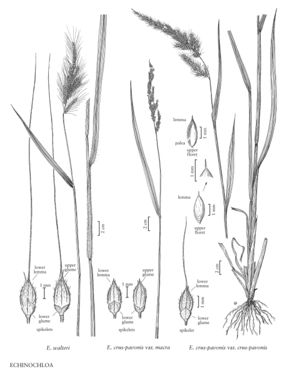Difference between revisions of "Echinochloa walteri"
FNA>Volume Importer |
GeoffLevin (talk | contribs) m (Fixed typo in synonyms) |
||
| (5 intermediate revisions by 2 users not shown) | |||
| Line 5: | Line 5: | ||
|common_names=Coast barnyard grass;Echinochloa de walter | |common_names=Coast barnyard grass;Echinochloa de walter | ||
|basionyms= | |basionyms= | ||
| − | |synonyms= | + | |synonyms= |
| − | |||
| − | |||
| − | |||
|hierarchy=Poaceae;Poaceae subfam. Panicoideae;Poaceae tribe Paniceae;Echinochloa;Echinochloa walteri | |hierarchy=Poaceae;Poaceae subfam. Panicoideae;Poaceae tribe Paniceae;Echinochloa;Echinochloa walteri | ||
|hierarchy_nav=<div class="higher-taxa"><div class="higher-taxon"><small>family</small>[[Poaceae]]</div><div class="higher-taxon"><small>subfamily</small>[[Poaceae subfam. Panicoideae]]</div><div class="higher-taxon"><small>tribe</small>[[Poaceae tribe Paniceae]]</div><div class="higher-taxon"><small>genus</small>[[Echinochloa]]</div><div class="higher-taxon"><small>species</small>[[Echinochloa walteri]]</div></div> | |hierarchy_nav=<div class="higher-taxa"><div class="higher-taxon"><small>family</small>[[Poaceae]]</div><div class="higher-taxon"><small>subfamily</small>[[Poaceae subfam. Panicoideae]]</div><div class="higher-taxon"><small>tribe</small>[[Poaceae tribe Paniceae]]</div><div class="higher-taxon"><small>genus</small>[[Echinochloa]]</div><div class="higher-taxon"><small>species</small>[[Echinochloa walteri]]</div></div> | ||
| Line 19: | Line 16: | ||
-->{{Treatment/Body | -->{{Treatment/Body | ||
| − | |distribution=Conn.;N.J.;N.Y.;W.Va.;Del.;D.C;Wis.;Ont.;Que.;Pacific Islands (Hawaii);Fla.;N.H.;Mass.;R.I.;La.;Tenn.;N.C.;S.C.;Pa.;Va.;Ala.;Ark.;Ill.;Ga.;Ind.;Iowa;Okla.;Md.;Tex.;Ohio;Mo.;Minn.;Mich.;Miss.;Ky. | + | |distribution=Conn.;N.J.;N.Y.;W.Va.;Del.;D.C.;Wis.;Ont.;Que.;Pacific Islands (Hawaii);Fla.;N.H.;Mass.;R.I.;La.;Tenn.;N.C.;S.C.;Pa.;Va.;Ala.;Ark.;Ill.;Ga.;Ind.;Iowa;Okla.;Md.;Tex.;Ohio;Mo.;Minn.;Mich.;Miss.;Ky. |
| − | |discussion=<p>Echinochloa walteri grows in wet places, often in shallow water and brackish marshes. It is a native species that extends through Mexico to Guatamala. It is found in both disturbed and undisturbed sites although not in rice fields. Occasional specimens of E. walteri with glabrous lower sheaths and short awns can be distinguished from E. crus-pavonis by their less dense panicles.</p> | + | |discussion=<p><i>Echinochloa walteri</i> grows in wet places, often in shallow water and brackish marshes. It is a native species that extends through Mexico to Guatamala. It is found in both disturbed and undisturbed sites although not in rice fields. Occasional specimens of <i>E. walteri</i> with glabrous lower sheaths and short awns can be distinguished from <i>E. crus-pavonis</i> by their less dense panicles.</p> |
|tables= | |tables= | ||
|references= | |references= | ||
| Line 29: | Line 26: | ||
-->{{#Taxon: | -->{{#Taxon: | ||
name=Echinochloa walteri | name=Echinochloa walteri | ||
| − | |||
|authority=(Pursh) A. Heller | |authority=(Pursh) A. Heller | ||
|rank=species | |rank=species | ||
|parent rank=genus | |parent rank=genus | ||
| − | |synonyms= | + | |synonyms= |
|basionyms= | |basionyms= | ||
|family=Poaceae | |family=Poaceae | ||
| − | |illustrator=Linda A. Vorobik | + | |illustrator=Linda A. Vorobik;Hana Pazdírková |
| − | |distribution=Conn.;N.J.;N.Y.;W.Va.;Del.;D.C;Wis.;Ont.;Que.;Pacific Islands (Hawaii);Fla.;N.H.;Mass.;R.I.;La.;Tenn.;N.C.;S.C.;Pa.;Va.;Ala.;Ark.;Ill.;Ga.;Ind.;Iowa;Okla.;Md.;Tex.;Ohio;Mo.;Minn.;Mich.;Miss.;Ky. | + | |illustration copyright=Utah State University |
| + | |distribution=Conn.;N.J.;N.Y.;W.Va.;Del.;D.C.;Wis.;Ont.;Que.;Pacific Islands (Hawaii);Fla.;N.H.;Mass.;R.I.;La.;Tenn.;N.C.;S.C.;Pa.;Va.;Ala.;Ark.;Ill.;Ga.;Ind.;Iowa;Okla.;Md.;Tex.;Ohio;Mo.;Minn.;Mich.;Miss.;Ky. | ||
|reference=None | |reference=None | ||
|publication title= | |publication title= | ||
|publication year= | |publication year= | ||
|special status= | |special status= | ||
| − | |source xml=https:// | + | |source xml=https://bitbucket.org/aafc-mbb/fna-data-curation/src/200273ad09963decb8fc72550212de541d86569d/coarse_grained_fna_xml/V25/V25_1113.xml |
|subfamily=Poaceae subfam. Panicoideae | |subfamily=Poaceae subfam. Panicoideae | ||
|tribe=Poaceae tribe Paniceae | |tribe=Poaceae tribe Paniceae | ||
Latest revision as of 14:36, 14 December 2022
Plants annual. Culms (30) 50-200+ cm tall, to 2.5 cm thick; nodes pilose or villous, upper nodes usually with sparser and shorter pubescence, occasionally glabrous. Lower sheaths usually hispid, hairs papillose-based, sometimes just papillose; upper sheaths hispid or glabrous; ligules absent; blades to 55 cm long, 10-35(60) mm wide, scabrous. Panicles 8.5-35 cm, erect to slightly drooping, nodes hispid, hairs 3.5-5 mm, papillose-based, sometimes sparsely so, internodes usually glabrous, sometimes hispid, hairs papillose-based; primary branches 1-10 cm, loosely erect, not concealed by the spikelets, nodes usually hispid, hairs papillose-based, sometimes glabrous, internodes scabrous, sometimes also sparsely hispid, hairs papillose-based; secondary branches present on the longer primary branches. Spikelets 3-5 mm, disarticulating at maturity, scabrous to variously muricate and hairy, hairs usually not papillose-based, margins sometimes with a few papillose-based hairs. Lower glumes usually more than 1/2 as long as the spikelets, abruptly narrowing to a fine, 0.5 mm point; lower florets sterile; lower lemmas usually awned, awns 8-25(60) mm; lower paleas subequal to the lower lemmas; upper lemmas 3-5 mm long, about 1.5 mm wide, not or scarcely exceeding the upper glumes, narrowly ovate to elliptical, coriaceous portion subacute, tips acuminate, membranous, without a line of hairs at the base of the tip; anthers 0.6-1(1.2) mm. Caryopses 1.2-1.8 mm, brownish; embryos 52-77% as long as the caryopses. 2n = 36.
Distribution
Conn., N.J., N.Y., W.Va., Del., D.C., Wis., Ont., Que., Pacific Islands (Hawaii), Fla., N.H., Mass., R.I., La., Tenn., N.C., S.C., Pa., Va., Ala., Ark., Ill., Ga., Ind., Iowa, Okla., Md., Tex., Ohio, Mo., Minn., Mich., Miss., Ky.
Discussion
Echinochloa walteri grows in wet places, often in shallow water and brackish marshes. It is a native species that extends through Mexico to Guatamala. It is found in both disturbed and undisturbed sites although not in rice fields. Occasional specimens of E. walteri with glabrous lower sheaths and short awns can be distinguished from E. crus-pavonis by their less dense panicles.
Selected References
None.
